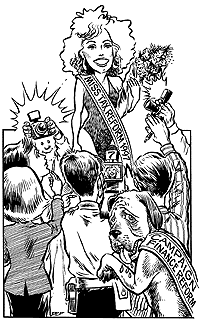Funny Money
Campaign Finance Reform: Who Cares?
By Robert Bryce, Fri., June 6, 1997
|
|
Texas is one of a handful of states that do not limit the amounts that individuals and political action committees can give to candidates. Because of that, one political action committee can have huge clout in legislative races. Before the elections last November, the Texans for Lawsuit Reform PAC gave freshman House member Ron Clark (R-Sherman) $120,722. That amounted to some 40% of all the money Clark raised for his campaign. Naturally, Clark insisted that TLR's money didn't influence his vote. He told the Dallas Morning News earlier this year that the tort reform group "bought into my campaign. I didn't buy into their agenda."
During the just-finished session of the Texas Legislature, an effort was made to limit the amounts that individuals and political action committees can give to candidates. There was also an attempt to modernize the reporting of campaign contributions and expenditures. Both efforts failed.
On May 15, a bill died on the House floor that would have capped individual contributions to candidates for statewide office at $25,000. The bill, authored by Rep. Pete Gallego (D-Alpine), would also have required political consultants to report their fees in excess of $5,000 per quarter. Gallego said he wanted to "get rid of the curtain that covers campaign consultants." But the bill was killed on the House floor on a technicality brought forward by Rep. Kent Grusendorf
(R-Arlington). "It was a blatant partisan effort to help Democrats at the expense of Republicans," said Grusendorf, who declined to state the partisan aspects of the bill. Gallego said the bill was killed because "there are those who are opposed to sunshine."
Another bill, authored by Sen. Rodney Ellis (D-Houston), that would have limited the size of campaign contributions, never made it to the Senate floor. In February, Ellis began talking about limiting individual contributions to a candidate to $3,000. In addition, he discussed limiting the total amount of PAC contributions a candidate could receive to $75,000. Ellis said money in politics is "corrupting the process." And he offers a simple explanation for the lack of legislative support for contribution limits. "We aren't feeling any heat," he said. The reason for the lack of heat, he believes, is that press coverage of campaign finance reform at the national level hasn't "trickled down to the state level. It hasn't become a burning issue in any state," he said. Ellis said he didn't expend much political capital fighting for contribution limits because, "I didn't want to make any more enemies than I have to. I have plenty of other opportunities to make enemies."
While the Legislature refused to limit contributions, it also failed to vote on a bill that would have given citizens around the state easier access to contribution and expense reports.
The bill, by Rep. Lon Burnam (D-Fort Worth), would have required candidates and officeholders to file their contributions and expense reports electronically. The bill died in committee. Proponents of the bill pointed out that if an electronic system was in place, candidates for races in the hinterlands would not have to travel all the way to the Ethics Commission office in Austin to review the contributions and expenditures of their opponents. In addition, electronic filing would make it easier to review contributor lists. In big races, like the governor's race, contributor lists can total more than 1,000 pages. Electronic filing would allow for easy sorting of contributions by size, affiliation, and even geographic area.
The most serious campaign finance reform to occur in recent years has taken place in judicial races. Under rules passed in 1995, statewide judicial candidates can accept a maximum of $5,000 from an individual. For more than a decade, Texas legislators have discussed imposing similar limits on themselves. In 1987, former Sen. John Montford of Lubbock introduced a bill that would have limited contributions to candidates by PACs and individuals to no more than $10,000. Montford began talking about the need to limit the costs of campaigns in the wake of the 1986 gubernatorial race, in which Mark White and Bill Clements spent $34.3 million, at the time the most expensive governor's race in state history. Montford's bill went nowhere. In 1989, Clements appointed a special task force headed by former Secretary of State Jack Rains to study limiting campaign contributions. Rains proposed limiting individual contributions to candidates to $5,000, and PAC contributions to $10,000. His proposal also went nowhere.
Former Speaker of the House-turned-lobbyist Gib Lewis has a theory on the lack of progress on the issue: "If anything, it's the fear of the unknown."
Or it may simply be the lack of a recent scandal. Judicial campaign finance reform came about in part because of publicity generated by big donations given to judges by tort lawyers. Campaign donations given by Houston attorney Joe Jamail to several judges who presided over the Pennzoil case caused a great deal of public scrutiny. Shortly after the Supreme Court ordered Texaco to pay Jamail's client, Pennzoil, a judgment of $11 billion, Jamail gave $50,000 each to the campaigns of two of the justices on the court. The incident aroused great media interest, including a spot on CBS' 60 Minutes in 1987.
Several members of the Legislature said that ethics reform and campaign finance reform only occur when something egregious happens that causes a public outcry. And there hasn't been any recent scandal to cause serious campaign finance reform to jump to the head of the legislative line.
Given that, perhaps Texans should hope that Pilgrim will come back to the Capitol as he did in the summer of 1989 and start handing out checks. After all, his legislative largesse spurred legislators to enact a number of provisions, including a prohibition against accepting political donations inside the Capitol building. It also helped spur the creation of the Texas Ethics Commission, and it tightened reporting requirements for lobbyists.
Sen. Carlos Truan, a Democrat from Corpus Christi, was one of the many who said that the Legislature will only take action on campaign finance issues when it is forced to by scandal. And then, Truan paid homage to Pilgrim. "Maybe our law is not the strongest," he said. "But I like to think it's stronger because of Bo Pilgrim."
Got something to say on the subject? Send a letter to the editor.









